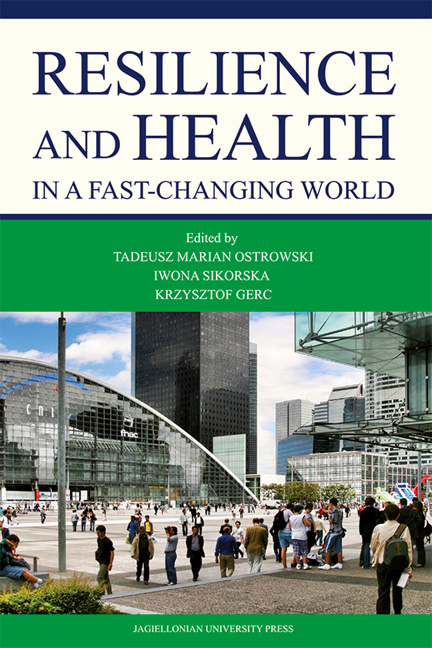Book contents
- Frontmatter
- Table of Contents
- Resilience from a Variety of Theoretical Perspectives: an Introduction
- I RESILIENCE IN THE PHILOSOPHICAL AND THE EXISTENTIAL CONTEXTS
- II SOCIAL CONTEXTS OF RESILIENCE
- Tough, Resistant, Hard: Resilience and Criminality
- Parentification and Psychological Resilience – the Example of Maturity Levels of Defense Mechanisms
- Science of Art in Prison
- III PROMOTING OF RESILIENCE AND ASSISTED RESILIENCE
- IV THREATS TO MENTAL HEALTH
- List of Authors
Tough, Resistant, Hard: Resilience and Criminality
from II - SOCIAL CONTEXTS OF RESILIENCE
Published online by Cambridge University Press: 12 January 2018
- Frontmatter
- Table of Contents
- Resilience from a Variety of Theoretical Perspectives: an Introduction
- I RESILIENCE IN THE PHILOSOPHICAL AND THE EXISTENTIAL CONTEXTS
- II SOCIAL CONTEXTS OF RESILIENCE
- Tough, Resistant, Hard: Resilience and Criminality
- Parentification and Psychological Resilience – the Example of Maturity Levels of Defense Mechanisms
- Science of Art in Prison
- III PROMOTING OF RESILIENCE AND ASSISTED RESILIENCE
- IV THREATS TO MENTAL HEALTH
- List of Authors
Summary
Abstract
The concept of resilience explains human ability to the good adaptation and functioning in situations abounding into considerable psychological loads. However resilience is identical nor with the psychical good health, nor with the social competence. The adaptation in specific conditions do not mean a compatible with social standards. Developing the high-level resilience joins with communities in the family and the local community, with the support and the cohesion of the peer group. In the depraved environment it is possible to develop the high level of self-efficacy, competence and self-esteem, and a positive bond with meaning persons (or with the meaning person) can be associated with the transmission of anti-values. The question appears therefore, how resilience is shaped in the case of criminal offenders? Authoresses of the elaboration show the configuration of psychosocial factors, related to resilience and responsible for resistant behaviours – in the form which is socially accepted or not accepted. They also present some possible directions of the work with prisoners, for the purpose of an increase of the resilience level or prevention to its reduction under the stressful conditions. The elaboration is theoretical; it is a form of literature review.
Key words: resilience, offenders, crime
Introduction
Criminal psychology recognizes many determinants of criminal behaviours (Hołyst, 2004). Only a portion of them are associated with the perpetrator's traumatic past (Courtney, Maschi, 2012; Lis-Turlejska, 2002) and emotional burdens that provoke aggressive reactions. In addition, only a very small group individuals among criminals could be diagnosed as psychopaths. A significant number of culprits engage in criminal activity in order to reap the potential benefits: satisfaction of psychological needs, material gain, and also social benefits like identification of a reference group. Many of them function for years as criminals, and their illicit career leads to a range of diverse experiences – successes, but also failures, conflicts, humiliations, physical injury, fraud, the collapse of family bonds, social alienation. Some are unsuccessful in plying their criminal trade, while others rise up their felonious career ladder and excel in their field. A great deal of attention is paid in penitentiary psychology to the trauma which may visited on inmates as a result of serving a custodial sentence and its psychosomatic consequences (Ciosek, 2003).
- Type
- Chapter
- Information
- Resilience and Health in a Fast-changing World , pp. 61 - 72Publisher: Jagiellonian University PressPrint publication year: 2015



